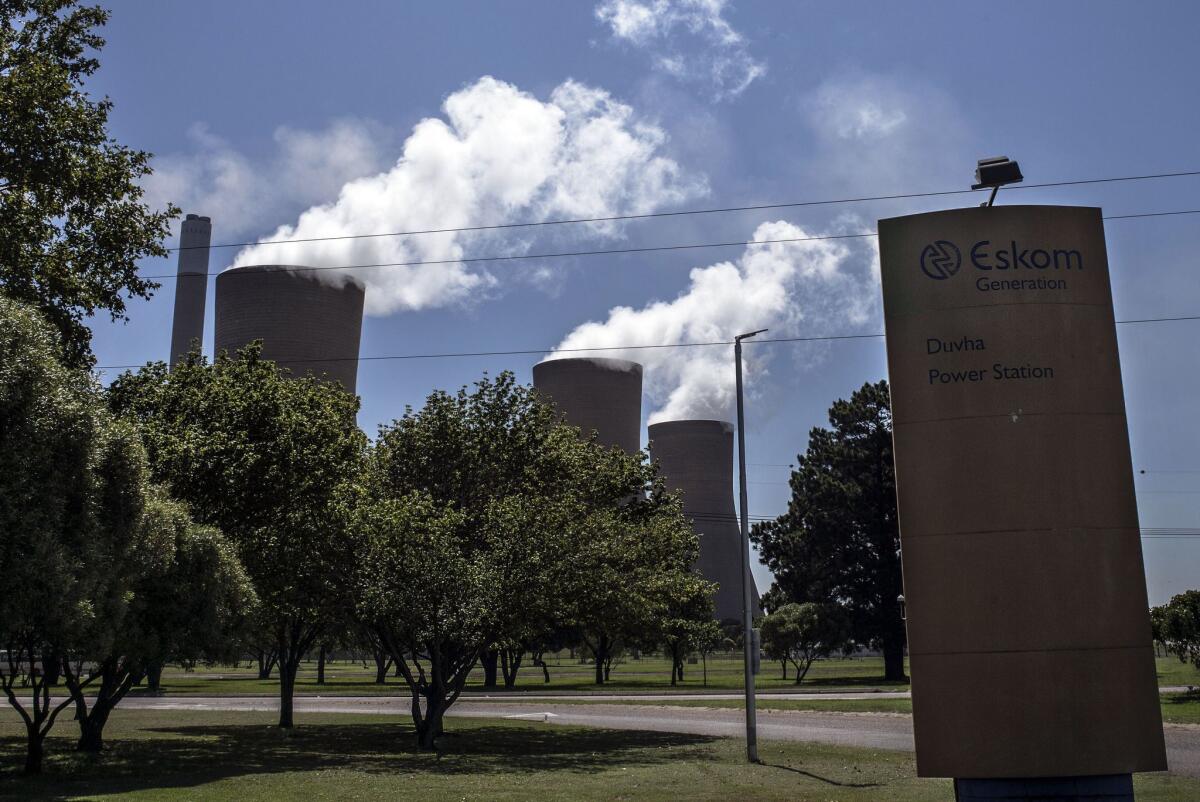South African firm suspends officials amid anger over power outages

- Share via
Reporting from Johannesburg, South Africa — In South Africa, people check the weather report for rain and thunder -- and the electricity report from the state-owned company Eskom for word on the frequent power blackouts.
Is it going to be a “stage three” day, with a very high likelihood of electricity outages across the country? Or just a “stage one” day?
Africa’s second-largest economy is facing an acute electricity crisis, with rolling blackouts -- or load shedding, in quaint bureaucratic parlance -- and fear that the grid could collapse if any more of its aging power stations break down.
Under intense government pressure, Eskom on Thursday suspended Chief Executive Tshediso Matona -- less than seven months after he was appointed to turn the utility around -- pending an inquiry into the company’s failures. The chief financial officer, Tsholofelo Molefe, and two other executives were also suspended.
Eskom’s mismanagement of the power grid could shave South Africa’s abysmal growth forecast of 2% to just a 1%, making it difficult to add much needed jobs to the economy. The outages have damaged the country’s reputation with investors and led to a tumble in the value of rand.
Public Enterprises Minister Lynne Brown said Thursday she had met the Eskom board the day before, “sharing my concerns, fears and frustration” about its problems.
“I am concerned about the instability at power plants; the financial liquidity of the utility; the lack of credible information; the unreliable supply of electricity and its dire impact on our economy; progress with the build program,” she said.
Brown said she was also upset about cost overruns, long delays in bringing new power plants online and the company’s failure to swiftly investigate problems as they arise.
Brown said the three-month inquiry will dive deep into the enterprise “to tell us what is wrong and how it should be fixed.”
“I have been inundated with complaints from the public and business about the reliability of the grid and its impact on the economy and the lives of ordinary men and women,” she said.
The biggest problem is how unpredictable the blackouts -- which Eskom typical explains as being caused by “unplanned maintenance due to technical faults” -- have been in recent months. In February, units generating about one-quarter of the nation’s power broke down, nearly overwhelming the grid.
Many observers have blamed the lack of maintenance performed at power stations and the failure to invest in new infrastructure.
“It all comes down to maintenance. Eskom has not stayed faithful to the maintenance regime,” Matona, the now-suspended chief executive, told journalists in January.
A senior official in Eskom, Oompie Aphane, told a parliamentary committee this week that the utility will face energy generation problems for at least three years.
Eskom, desperately short of cash flow, also struggles to buy coal and diesel fuel to generate energy. Its increasing spending on diesel for its gas turbines, which are often used to provide emergency electricity when demand peaks, has left a funding shortfall of $16 billion. The government has offered an injection of $1.8 billion.
“The frequency and magnitude of the equipment failures of the aging, coal-fired power stations clearly show that Eskom has lost control over its fleet of power stations,” wrote analyst Sikonathi Mantshantsha in the Business Day newspaper. “The lack of investment in generating capacity over the past 20 years, the poor maintenance of existing assets, together with the flight of skills from the organization, have all landed the nation in a sea of darkness.”
The head of the South African Chamber for Commerce and Industry, Vusi Khumalo, said in January that the impact of blackouts on business and business confidence was “inestimable.”
South Africa’s mining industry and related businesses, which contribute about 17% of the gross domestic product, are particularly hard hit, with some mines forced to shut down during load shedding. Mining output fell by 4.7% in January, compared with a year earlier, mainly due to power outages.
Some analysts suggested that conducting an investigation and suspending Eskom’s top managers in the middle of a crisis would only make things worse.
“We do not believe an inquiry is necessary. We think it does not indicate that a crisis is being sorted out or dealt with, but the exact opposite -- it is an unnecessary distraction at a time when Eskom needs decisive, stable and strong leadership,” wrote Peter Attard Montalto, an economist and emerging markets analyst with Nomura Bank.
“Eskom is now basically taking a three-month gap of leadership in which time difficult decisions are unlikely to be made,” he said, adding there were fears that Matona was suspended because powerful unions were unhappy with him.
Montalto said a small addition of energy to the grid after the recent connection of the new Medupi power station wasn’t enough to avert the ongoing crisis and only prevented the government taking the tough decisions needed.
“Overall, we still do not believe the government fully understands the crisis that is occurring on energy security,” he said.
Follow @robyndixon_LAT on Twitter for news out of Africa
More to Read
Sign up for Essential California
The most important California stories and recommendations in your inbox every morning.
You may occasionally receive promotional content from the Los Angeles Times.










